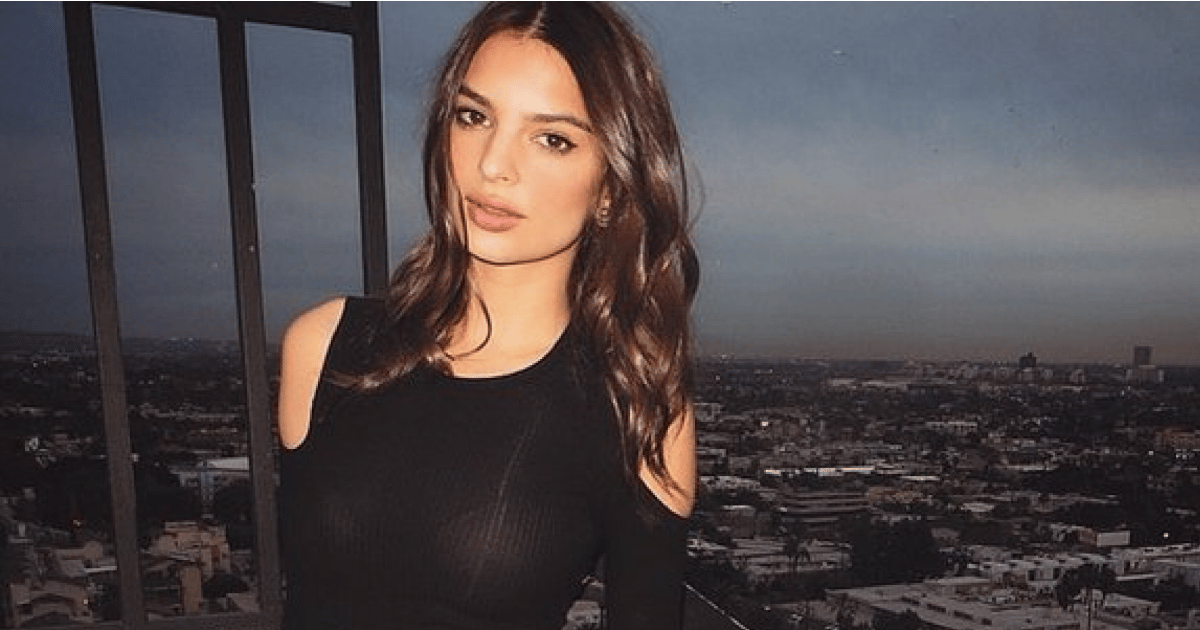
Emily Ratajkowski was the near-nude woman Robin Thicke’s Blurred Lines video. She gave a nuanced performance opposite Ben Affleck in Gone Girl.
She was also a 12-year-old with breasts that were very large on her slender frame.
This week Emily penned a powerful essay for Lena Dunham’s newsletter Lenny about her early development and the pressure she felt to hide her body while growing up.
At 12, she was already a D-cup — a “baby woman”, as her dad lovingly described her.
After being stamped as ‘sexy’ by society at such a young age, her adolescence was spent self-consciously trying to navigate the expectations of an adult world she did not yet feel apart of.
Teachers, friends, family members and even strangers made her feel that her that her body was shameful, dangerous, something to be hidden — regardless of their good intentions.
At 13, Ratajkowski appeared in a school play and was afterwards taken aside by a concerned family member. She recalls being told that her innocently-chosen lip gloss, red button-up top and a mod-style zip-up miniskirt could put her at risk.
“Our family member sobbed to my mother and me at dinner after; she was worried for me, worried about the looks I got from men, because I was wearing what I was wearing. I needed to protect myself, she explained.”
That same year, another friend approached her at a dinner party, “You need to hide out, a girl like you, keep a low profile,” he told her.
Top Comments
Kudos Emily! It makes me so angry that girls and women are told to cover up for fear of being sexualised, or worse, blamed when sexually assualted.
Having dealt with it myself (petite frame and an E-cup by the time I started highschool at 11), I now make sure that my daughters know their bodies are nothing to be ashamed of.
A girl/woman shouldn't feel bad about her body, no matter her age. She should not feel ashamed by any bodily changes that occur during her life.
I now refuse to have a family 'friend' in my house after comments he made regarding my then 16yo daughter who was dressed in her pjs, in our own home, he decided that in his words "her tits were hanging out" even though she was wearing a hoodie over her pajama top.
Another (former) male friend made a comment about allowing that same daughter to wear a knee length, short sleeved red dress, because he found it too sexy. There was nothing sexual at all about the dress, nor about her pose (I've used this image multiple times for various art exhibitions, not one other person has had that reaction to my knowledge).
It's time that males are taught that women are not objects for their pleasure, and that no one is responsible for their feelings but themselves. Stop blaming your pedophilic urges on young women who can't help their genetics.
I had a "baby woman" body by the time I was 11 and was very aware of the looks I was getting from boys and men.
It was a bit of a mixed experience with males- I didn't mind the attention from guys my age or a little older, but I found it very creepy when much older men and even fathers would stare at me (even in the presence of their partners and children).
My experience with females was more negative. Girls who didn't know me well disliked me on sight and even some of my friends made it clear to their boyfriends that I was to be avoided.
While my parents never told me to cover up, my father would intervene if he saw me talking to a guy and my mother would warn me to be very careful and "respect myself".
I do think our society is afraid of women's sexuality and young women in particular. I never heard of anyone telling a young man to be careful for himself- my mother is a feminist who loves men and she told her son's to always respect women but never told them to respect themselves.
I can entirely relate to your experience, although it continued into adulthood, having been told by a female manager to wear a shawl (seriously??) to further cover my already professional attire (I work in HR so I am well versed in appropriate office dress code). This one was the most bizarre hence why I recall it, but there have been so many hurtful comments over the years. It's tough being treated like you're flaunting your breasts when in actual fact they're your biggest insecurity. I definitely am sick of them being a talking point, even in my 30s.